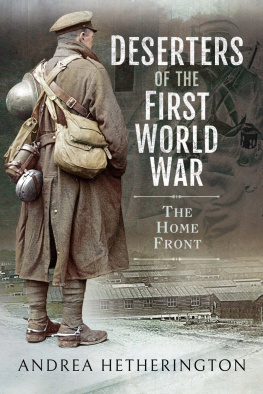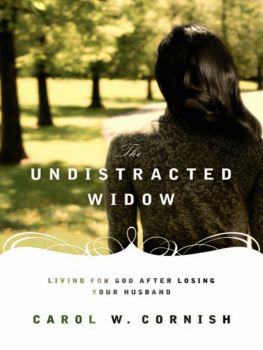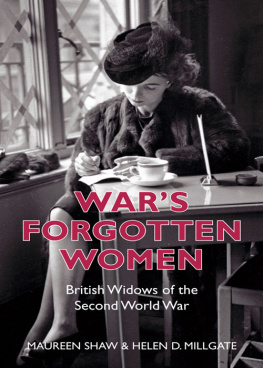British Widows of the First World War
British Widows of the First World War
The Forgotten Legion
Andrea Hetherington
First published in Great Britain in 2018 by
Pen & Sword Military
Pen & Sword Books Limited
47 Church Street
Barnsley
South Yorkshire
S70 2AS
Copyright Andrea Hetherington 2018
ISBN 978 1 47388 676 6
eISBN 978 1 47388 678 0
Mobi ISBN 978 1 47388 677 3
The right of Andrea Hetherington to be identified as Author of this work has been asserted by her in accordance with the Copyright, Designs and Patents Act 1988.
A CIP catalogue record for this book is
available from the British Library.
All rights reserved. No part of this book may be reproduced or transmitted in any form or by any means, electronic or mechanical including photocopying, recording or by any information storage and retrieval system, without permission from the Publisher in writing.
Pen & Sword Books Limited incorporates the imprints of Archaeology, Atlas, Aviation, Discovery, Family History, Fiction, History, Maritime, Military, Military Classics, Politics, Select, Transport, True Crime, Air World, Frontline Publishing, Leo Cooper, Remember When, Seaforth Publishing, The Praetorian Press, Wharncliffe Local History, Wharncliffe Transport, Wharncliffe True Crime and White Owl.
For a complete list of Pen & Sword titles please contact
PEN & SWORD BOOKS LIMITED
47 Church Street, Barnsley, South Yorkshire S70 2AS, United Kingdom
E-mail:
Website: www.pen-and-sword.co.uk
Acknowledgements
Firstly, I must thank Dr Peter Liddle for starting me on this project and for his work in compiling the collection that bears his name at the University of Leeds. The staff at Special Collections at the university have been most helpful as always, particularly Fiona Gell, Karen Mee, Tim Procter, Matthew Dunne and Hannah Wynne. Professor Alison Fell and the Legacies of War team at the University of Leeds have been a great source of support and encouragement, as has Lucy Moore of the Leeds Museums Service.
I would like to thank all of the staff at the National Archives, Eleanor Johnston at the University of Staffordshire, the staff at the Womens Library at the London School of Economics, and everyone at the Salvation Army Heritage Centre for their help. The staff at Leeds Central Library are unfailingly helpful in retrieving obscure items that have not been loaned in years, and I thank them for all of the trips they have made to the depths of the building on my behalf.
I want to thank Graham Wright and Jackie Coleman for sharing their family stories with me, and Pauline Baldwin for allowing me to use material from her familys file at the Liddle Collection.
On a personal note, I would like to thank my mother, Maureen Hetherington, for sharing my own familys story. Sapper Joseph Lamb was my great-grandfather. My mother is a widow herself and I would like to thank her for bearing her own grief with patience and fortitude and making many sacrifices on behalf of her children.
Lastly, I would like to thank Linda Gilhespy for her incredible patience and tolerance for the many hours I have spent stuck at my desk.
Chapter 1
Lady Visitors and Army Wives
I could not tell you this morning the insults I got from a visitor.
Traditionally, soldiers wives were not well looked after by Britains armed forces. Soldiers were not allowed to marry without permission, and only a certain number in any one battalion would be granted that honour. These wives were then considered to be on the strength and would be provided for and even allowed to follow their husbands abroad. Should their husbands die in combat during these postings, the wives were allowed to share the regiments resources for six months before they must either return to England or remarry. Rates of remarriage were accordingly high amongst these women.
The army itself had a poor reputation at home. Recruits during the Victorian and Edwardian eras were often men with nothing better to do rather than those with hearts set on a military career. Soldiers were not looked on kindly by the general populace, being banned from public houses in some places and tolerated, rather than welcomed, in others. Their active service was in far-flung parts of the Empire rather than just across the Channel, so the notion that they were the defenders of the nation was hard to sustain. This lack of respect also applied to soldiers wives, who were seen as lower-class women with suspect morals. Some of this would change with the advent of the First World War, though unfriendly attitudes towards soldiers dependants can still be discerned in the way they were treated by some agencies.
Widows and orphans of those killed in action were on their own unless they had been married on the strength. During the Crimean War charitable donations were made by the general public for the relief of widows and orphans of the conflict. These sums were large and a body called the Royal Patriotic Fund Corporation (RPFC) was set up to distribute them amongst the needy. This was the beginning of any organized effort to support war widows financially, though, notably, it did not come from the state. The First Boer War in 1881 saw pensions paid to war widows from the public purse for the first time. The War Office only paid out if a man was killed in action or died of his wounds, and the amount paid was a years soldiers salary, not a lifetime payment. Once again, this was only for wives considered to be on the strength.
The Second Boer War, which began in 1899, was of a different character to the many small wars fought in the nineteenth century, partly because it attracted a significant number of volunteers to the armed forces from all over the Empire. Press coverage was more extensive, public opinion of a soldiers status changed accordingly and a great deal of fundraising work was done at home to provide for the wives and widows of those fighting in South Africa. Rudyard Kipling composed a poem for the Daily Mail in return for a donation to the RPFC and over a million pounds was raised generally from 1899 to 1901. The RPFC sent 5 to every widow and 1 for every child when a soldiers death was reported, the monies being sent direct to the widow via the Post Office. The Daily Telegraph raised enough money to administer its own widows and orphans fund, which paid 20 to the widow immediately, then an annuity of 5s 9d a week thereafter. After lobbying from the RPFC and others, the state finally and grudgingly took some responsibility for war widows by the Royal Warrant of 25 June 1901, which granted pensions to on the strength widows on a scale according to the soldiers rank, beginning at five shillings a week for the wife, with extra allowances for the children. Widows who remarried did not lose their pensions, but were paid at half the previous rate. The state was still taking no responsibility for off the strength wives, and the total number of Boer War widows eligible for a pension was a mere 3,000.









